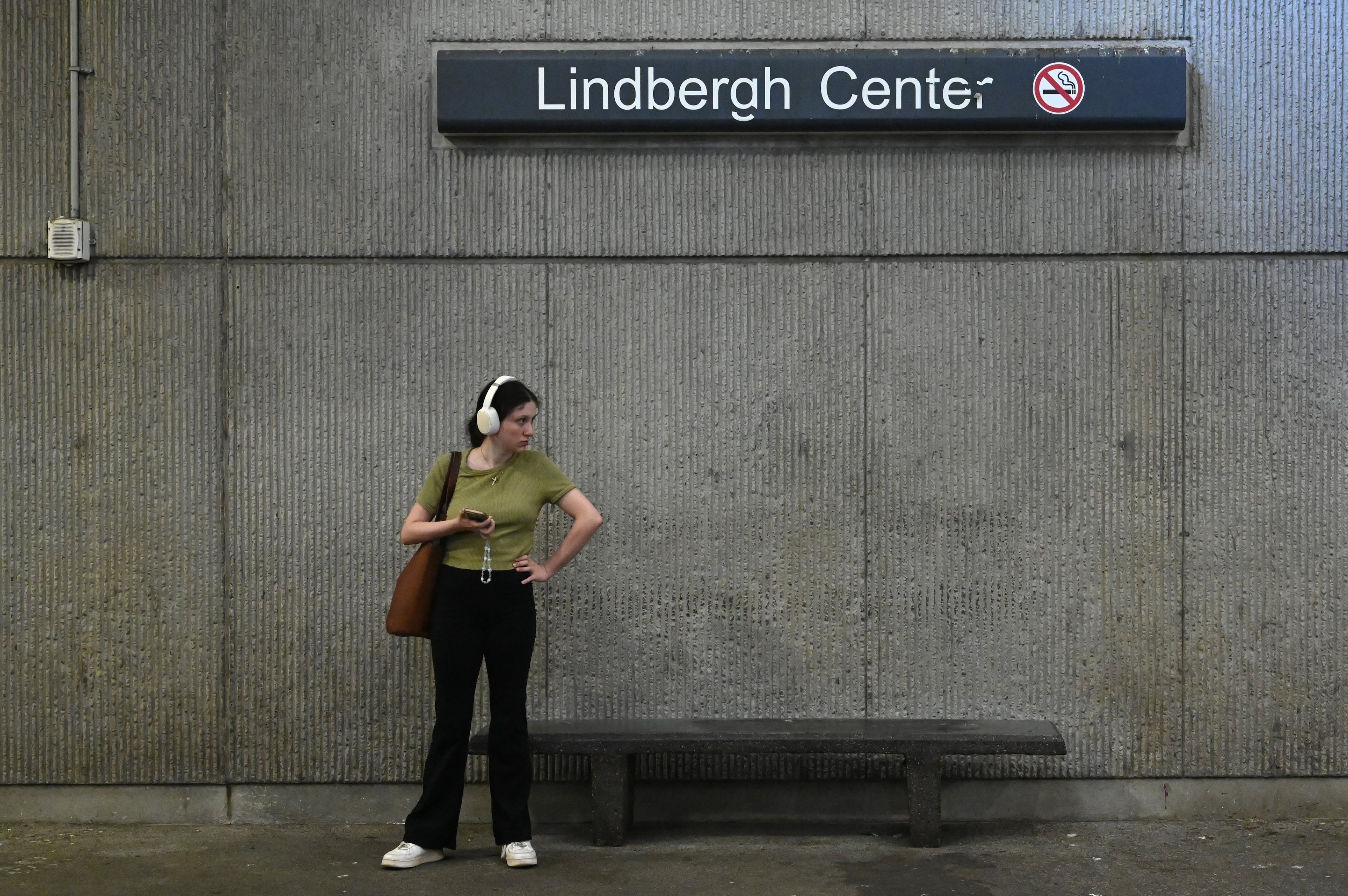In case you missed it: 5 memorable moments from the Decatur Book Festival

Book lovers gathered Saturday for the 20th anniversary of the Decatur Book Festival.
More than 100 authors sat on roughly four dozen panels held at the First Baptist Church of Decatur, Marriott Conference Center, Decatur Library and outdoor stages.
A street fair with artisan vendors, a book marketplace and food trucks gave festivalgoers a chance to eat, shop and listen to live music between panels.
“Our 20th anniversary festival exceeded every dream we had for it,” executive director Leslie Wingate said. “Watching thousands of readers connect with some of today’s most impactful authors was truly special. … It was a brilliant reminder of how literature connects us now, just as it did 20 years ago.”
In case you missed it, here are five memorable moments from five author talks.

Mary Roach entertained with zany research tales
One might expect books about advances in medicine and science to be dry and academic.
Not so when written by Mary Roach, an author with an eccentric personality and insatiable curiosity willing to do just about anything in the name of research.
Roach had the audience howling as she recounted some of the firsthand adventures she’s taken in order to write vivid scenes in her seven nonfiction books and magazine feature articles in National Geographic and The New York Times Magazine.
She shared how she once had two hair follicles transplanted from her scalp to her leg to see if she could grow a “long, luxurious thigh hair.” She tracked down an iron lung, hoping to sleep inside the outdated breathing contraption (she lasted only seven minutes before it was too uncomfortable). She got caught trying to pocket a real human lens after she observed a cataract surgery in Mongolia.
She went to Antarctica to traverse the polar plains on a snowmobile to find meteorites in ancient ice. She’s even personally tested out a vaginal weightlifting device, which she said felt “like giving birth to a doorknob.”
Her tales, told with panache, made her panel one of the most entertaining of the day. Her latest book, “Replaceable You: Adventures in Human Anatomy” (W.W. Norton & Company, $29), hit shelves last month. It explores advances in prosthetics, transplants, organ printing and gene editing.

Atlanta chef Steven Satterfield said produce is his plate’s guiding star
At the culinary stage, chef Steven Satterfield, co-owner of Atlanta restaurants Miller Union and Madeira Park, introduced his audience to his 2023 cookbook, “Vegetable Revelations: Inspiration for Produce-Forward Cooking” (Harper Wave, $50).
While talking with moderator Ligaya Figueras, former dining editor for The Atlanta Journal-Constitution, Satterfield multitasked by also cooking his recipe for Portuguese Bread Soup: a vegetable rich broth with greens served over homemade sourdough croutons and a floating poached egg.
As he sauteed onions and garlic with jewel-toned chard stems in olive oil to prepare the soup base, he spoke about how, even as an omnivore, he favors making produce the star. Satterfield also subscribes to a root-and-stem philosophy, which means using all parts of a vegetable.
He offered some tips: With kale stems, try juicing them, whisking them with some egg and using it as a batter for a savory French toast. Top with eggs and ham for a fun riff on green eggs and ham.
Always cut the stems of greens crosswise to break up the fibrous strings. Sautee or puree into any number of delicious accoutrements.
With turnips (in his opinion, the most underrated root vegetable), try this grilling method: Turn on both sides of the grill; let it get hot; turn off one side; place the turnip bulbs on the side where the flame is, and the greens on the side with the flame off. Use Japanese Hakurei turnips for a real treat.
“I serve them with a miso scallion vinaigrette,” he said.
Satterfield also taught his audience how to prepare the perfect poached egg: separate each egg into individual containers first; add a touch of white vinegar to the simmering water (which aids the egg white to solidify); swirl the water; drop in the egg and watch it “go on a little river ride,” he said. The eggs turned out beautifully.
Jason Mott was as unabashed in person as on the page
After Jason Mott won the 2021 National Book Award for “Hell of a Book,” his fictional novel about a Black author on a book tour, he was stunned.
“It is such a prestigious (prize) that unless you have a Kanye West-level ego, you’re not (expecting it),” he said Saturday while talking with moderator Joe Barry Carroll, the former NBA All-Star turned author. But when he won, Mott used his award statue ceremoniously.
“The statue weighs 8 pounds. It’s brass. It stands about yea tall,” Mott said, demonstrating. “And here’s a fun fact: It’s designed to look like sheets of paper kind of rolled up, and it’s got a dip in the top of it, just enough for a shot of bourbon. So, after I won it, I went to a bar with my friends and drank Champagne and moonshine out of it.”
The win was also interesting, Mott said, because with “Hell of a Book,” he changed course. In his previous novels, he had tried to avoid race. Yet, whenever he was interviewed, he inevitably was asked about it.
“I’d say, ‘Oh man, the weather’s nice today.’ And they’d be like ‘Well, how does the weather feel as a Black man?’” Mott recalls. “I got really resentful.”
But with “Hell of a Book,” Mott said “I’m going to just lean into it. And that’s the one that wins the National Book Award. There’s some dark irony in that.”
His latest novel, “People Like Us” (Dutton, $30), which came out in August, interweaves two narratives of Black writers trying to find peace and belonging in a country scarred by gun violence.
The book has been described as wickedly funny and achingly sad. He incorporates magical realism, he said, to “capture the feelings more than the facts.” He is characteristically unabashed with his word choices, reclaiming controversial racial slurs and using cusswords.
“I love a good cussword,” he said chuckling. “A good F-drop here and there — it just solves problems. … Every word is a tool, … we decide its power.”

Panel proves true crime can be a tool for justice
At the Southern True Crime panel, the audience did not know that somewhere in the middle row sat Dennis Perry, a man who served 20 years in prison for a double murder he did not commit.
Near the end of the panel, he stood up to applause.
Perry is free today thanks to the dogged investigative reporting of Joshua Sharpe, who sat on stage to discuss his nonfiction book, “The Man No One Believed.” The book uncovered how Perry was wrongfully convicted of the 1985 killings of Harold and Thelma Swain inside Rising Daughter Baptist Church in Camden County.
Sharpe first encountered Perry’s case while working as an investigative reporter at The Atlanta Journal-Constitution. What began as a feature article quickly outgrew the confines of the paper. So Sharpe decided to write a book. His years of reporting ultimately contributed to Perry’s exoneration in 2020 at age 58.
Sharing the stage with Sharpe was Ann Hite, author of “I Am a Georgia Girl,” a meticulously researched book that gives voice to Lucille Frank, the wife of Leo Frank, whose 1915 lynching remains one of Georgia’s most infamous cases.
To finally give Lucille Frank a voice, Hite immersed herself in letters, newspaper archives and family histories. Hite painted a portrait of a courageous and determined 26-year-old woman who fought to prove her husband’s innocence while a corrupted system pursued, dead-set on pining the murder on the wrong man.
Moderated by Deb Miller Landau, author of another true crime novel, “The Devil Went Down to Georgia,” the panel highlighted how non-fiction narrative can be a tool for justice.
Jet Hatmaker got vulnerable discussing her new memoir ‘Awake’
For most of her career, Jen Hatmaker was known as an evangelical author, speaker, blogger and writer who blended humor and faith to offer commentary and practical guidance. But in 2020, after discovering her husband’s infidelity, her marriage fell apart. Her 14th book, “Awake” (Convergent, $28), which came out Sept. 23, marks a bold departure from her previous style.
It is a raw and vulnerable memoir, written in the form of nonchronological narrative vignettes spanning 40 years. Each story illuminates how she unknowingly built her life with bricks bound to crumble.
In a conversation with Barbara Brown, New York Times bestselling author, Hatmaker told audiences the story of her awakening and reinvention
“It turns out,” she said, “I had been operating in a codependent fashion my entire marriage. I was always trying to control someone else’s behavior, then cleaning up their wake so they didn’t have to face the consequences.”
Therapy forced her to stop managing others’ responses and start taking responsibility for her own patterns, but it also helped her see the influences that shaped her growing up. She explores them in the book.
“I’m looking at patriarchy and misogyny and gender norms and body shame and purity culture,” Hatmaker said. “As I began to examine those (while writing), I found out maybe it’s not such a shock that this house fell down.”
She also spoke about the unavoidable pain that accompanies awakenings.
“Most of us don’t sleepwalk through our lives on purpose,” she said. “But there is a cost to not telling yourself the truth. … Your body will pay it, your soul will pay it, your future will pay it.”
The truth, it turns out, is what set Hatmaker free.



